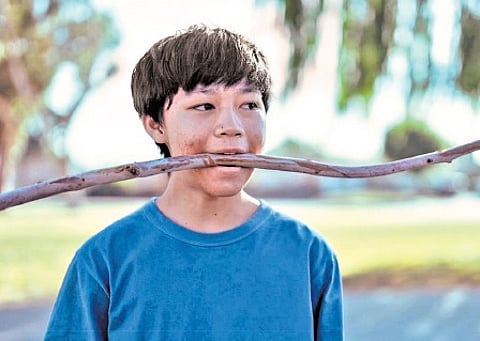

Debut films usually emerge from a deeply personal space. Sean Wang’s Didi, which won the audience award in the US Dramatic Competition at the Sundance Film Festival earlier this year, harks back to his own adolescence.
The coming-of-age film is set in the summer of 2008, before the start of the high school, and revolves around a 13-year-old Taiwanese American boy Chris Wang (Izaac Wang), his sibling, mother, grandmother, and his universe of friends and foes.
There’s a sense of rootedness when it comes to the inherited culture that Didi (a Chinese term of endearment used for the youngest son in the family) is born into as well as a sense of belonging for the diverse set of people outside, who call him Wang Wang. All of it goes into the making of a unique hyphenated identity, which is the same for a lot of Didi’s friends as well. They are first-generation teenagers from countries around the world. I was especially happy to see South Asian-American Fahad, Rishi, and Hardeep in Chris’s multi-cultural mix of a friend group, as I was happy to hear him being referred to as “my little Ang Lee”, the biggest Taiwanese success in Hollywood.
But, beyond the specificity of these identity issues, Sean’s narrative is a broader, vibrant and lively journey through the highs and lows of teenage years. There’s the fun, games, and pranks on the one hand and the challenges of heartbreaks, fissures in friendships and crises within the family to deal with. Growing up is as much about accepting it all as a part of life and finding peace with your own perennially evolving self.
“I wish my adolescent self was kinder to myself. I wish I wasn’t such a brat to my sister and my family. I really think of this movie as a thank-you-and-I’m-sorry-and-I-love-you to my family and my friends,” said Sean at the film’s premiere. It’s precisely this that strikes an emotional chord. It’s not tough to figure out how it has been such a crowd-pleaser in its limited run so far. There’s a genuineness, authenticity and relatability to his protagonist. Didi would rather be skateboarding, fiddling with tech, the internet, the early social media and music of the day than spending time with his mother (Joan Chen), wondering about the curiously missing father, fighting with elder sister (Shirley Chen) and making peace with crotchety grandma Nai Nai (Chang Li Hua). Didi is someone the teens will see themselves in and he is also a reminder to the adults of their past, the formative years that have made them who they are now.
Sean directs with confidence and control, there’s playfulness in his storytelling as well as an all-enveloping empathy and tenderness. The humour never goes over the top, nor do the emotional sequences turn cheesy or overly sentimental. Much of the film’s strength derives from the precision and profundity of its writing but it’s the ensemble cast of mostly first-time actors that makes things come alive on screen with realistic performances. Be it the times of harmony or ugly fights, love or dissension, together they feel like real family, friends, neighbours and community. You laugh with them just as you cry along with them.
In that sense, the film itself is a welcome addition to the resonant contemporary American immigrant sagas like Minari and Past Lives. But one with a unique indie charm of its own.